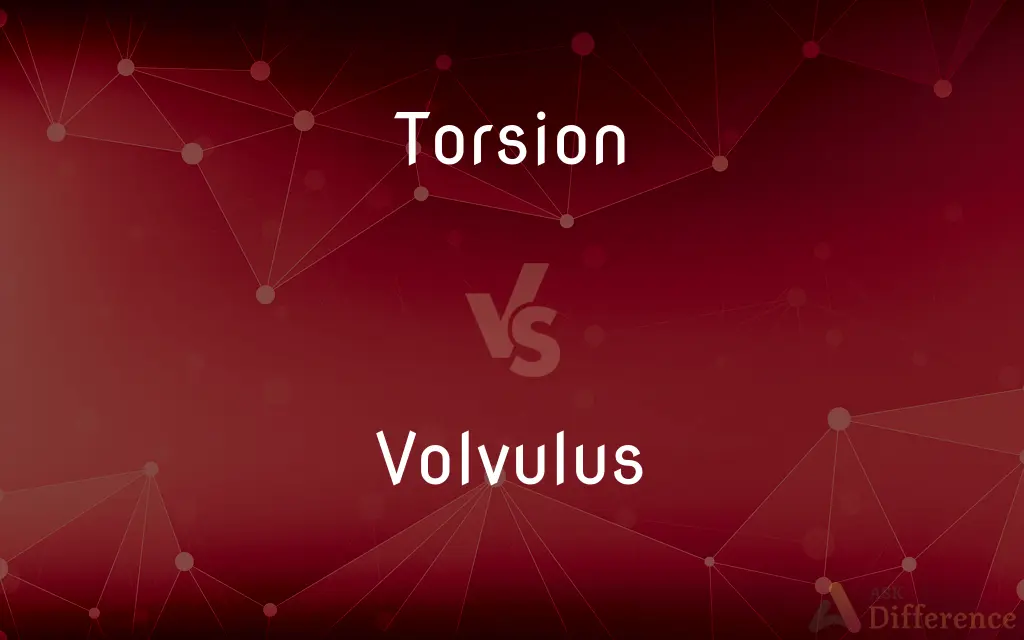Torsion vs. Volvulus — What's the Difference?
Edited by Tayyaba Rehman — By Urooj Arif — Updated on March 20, 2024
Torsion refers to the act of twisting or the state of being twisted, especially around a long axis, while volvulus is a specific medical condition where an organ, particularly the intestine or stomach, twists upon itself, causing an obstruction.

Difference Between Torsion and Volvulus
Table of Contents
ADVERTISEMENT
Key Differences
Torsion is a general term that can apply to various contexts, from mechanical engineering to biology, and describes the action or result of something being twisted. It can refer to the stress or deformation of structures due to twisting forces. In medical terms, torsion can describe the twisting of an anatomical part, such as an ovary or testicle, which can compromise blood flow and necessitate urgent treatment.
Volvulus, on the other hand, is a specific type of torsion that occurs within the body and usually refers to the gastrointestinal tract. It involves the twisting of a loop of the intestine or stomach, which can lead to a blockage and cut off the blood supply. Volvulus is considered a medical emergency because it can cause severe complications, including gangrene of the affected section of the gut if not promptly addressed.
While torsion can occur in various parts of the body and in non-biological contexts, volvulus is specifically used to describe a condition in the digestive tract. Torsion in a medical context might not always result in a significant obstruction or ischemia, but volvulus, due to its nature, almost always leads to an obstruction and requires immediate medical attention.
The diagnosis and treatment of these conditions differ significantly due to their nature and severity. Torsion might sometimes resolve on its own or may require non-surgical interventions, depending on the part of the body affected and the severity. Volvulus, however, often requires surgical intervention to untwist the affected segment of the intestine and restore normal blood flow and function.
Comparison Chart
Definition
The act or state of twisting, especially around a long axis.
A medical condition where an organ twists upon itself, causing an obstruction.
ADVERTISEMENT
Contexts
Can occur in various mechanical and biological contexts.
Specifically refers to a condition in the gastrointestinal tract.
Implications
May or may not lead to significant complications, depending on the context and severity.
Often leads to an obstruction and is considered a medical emergency.
Treatment
Can vary from observation to non-surgical or surgical interventions.
Often requires surgical intervention to correct.
Examples
Torsion can occur in the ovaries, testicles, or other parts.
Commonly involves the twisting of the intestine or stomach.
Compare with Definitions
Torsion
The action of twisting or the state of being twisted.
Torsion of the spinal column can lead to significant discomfort.
Volvulus
A condition where part of the intestine or stomach twists, causing an obstruction.
The patient was diagnosed with sigmoid volvulus and required emergency surgery.
Torsion
Can apply to situations where rotation around an axis occurs.
The torsion of the plant's stem was caused by uneven sunlight exposure.
Volvulus
Can cause severe abdominal pain, vomiting, and bloating.
Symptoms of volvulus include severe pain and distension of the abdomen.
Torsion
A mechanical term referring to the stress caused by twisting.
The torsion in the bridge's support cables was carefully calculated.
Volvulus
Often leads to a blocked blood supply to the affected area.
Volvulus can lead to necrosis of the intestine if not treated promptly.
Torsion
The deformation of a structure due to a torque.
The engineer assessed the beam for signs of torsion.
Volvulus
Requires immediate medical attention to prevent serious complications.
The sudden onset of symptoms suggested volvulus, necessitating an urgent CT scan.
Torsion
In medicine, the twisting of an anatomical part, which can impair blood flow.
Ovarian torsion requires prompt medical intervention to save the ovary.
Volvulus
Mostly involves the gastrointestinal tract but can vary in location.
Cecal volvulus is less common but can be equally serious.
Torsion
The act of twisting or turning.
Volvulus
A volvulus is when a loop of intestine twists around itself and the mesentery that supports it, resulting in a bowel obstruction. Symptoms include abdominal pain, abdominal bloating, vomiting, constipation, and bloody stool.
Torsion
The condition of being twisted or turned.
Volvulus
Abnormal twisting of the intestine causing obstruction.
Torsion
The stress or deformation caused when one end of an object is twisted in one direction and the other end is held motionless or twisted in the opposite direction.
Volvulus
(medicine) Obstruction of the bowel in which a loop of bowel has abnormally twisted on itself.
Torsion
The act of turning or twisting, or the state of being twisted; the twisting or wrenching of a body by the exertion of a lateral force tending to turn one end or part of it about a longitudinal axis, while the other is held fast or turned in the opposite direction.
Volvulus
The spasmodic contraction of the intestines which causes colic.
Torsion
(mechanics) That force with which a thread, wire, or rod of any material returns, or tends to return, to a state of rest after it has been twisted; torsibility.
Volvulus
Abnormal twisting of the intestines (usually in the are of the ileum or sigmoid colon) resulting in intestinal obstruction
Torsion
(surgery) The stopping of arterial haemorrhage in certain cases, by twisting the cut end of the artery.
Torsion
The act of turning or twisting, or the state of being twisted; the twisting or wrenching of a body by the exertion of a lateral force tending to turn one end or part of it about a longitudinal axis, while the other is held fast or turned in the opposite direction.
Torsion
That force with which a thread, wire, or rod of any material, returns, or tends to return, to a state of rest after it has been twisted; torsibility.
Torsion
A tortuous and twisted shape or position;
They built a tree house in the tortuosities of its boughs
The acrobat performed incredible contortions
Torsion
A twisting force
Common Curiosities
Is torsion always a medical emergency?
Torsion can be a medical emergency, especially when it occurs in organs like the ovaries or testicles, as it can compromise blood flow. However, its urgency can vary depending on the location and severity.
What causes torsion in the body?
Torsion in the body can be caused by various factors, including congenital malformations, sudden movements, or underlying health conditions that affect the stability or mobility of organs.
What are the symptoms of volvulus?
Symptoms of volvulus include severe abdominal pain, vomiting, bloating, and the inability to pass gas or stool, indicating a blockage.
What is the prognosis for individuals with volvulus?
The prognosis for individuals with volvulus depends on the rapidity of diagnosis and treatment, the length of the intestine affected, and the presence of complications like necrosis. Early intervention generally leads to better outcomes.
How is volvulus diagnosed?
Volvulus is typically diagnosed through imaging studies like X-rays, CT scans, or MRI, which can show the twisted segment of the intestine or stomach.
Can torsion occur in non-organic materials?
Yes, torsion can also occur in non-organic materials, especially in mechanical and structural engineering contexts, where it refers to the twisting of objects due to applied forces.
Can volvulus recur after treatment?
Volvulus can recur, especially in cases where the underlying anatomical conditions that predispose to twisting are not corrected during surgery.
How is volvulus treated?
Treatment for volvulus usually involves surgical intervention to untwist the affected segment and may include resection of any necrotic tissue.
Can torsion lead to volvulus?
In a medical context, torsion of certain organs, like the intestine, can lead to volvulus if the twisting causes a significant obstruction and impairment of blood flow.
Are there preventive measures for volvulus?
Preventive measures for volvulus are limited, especially for congenital forms. However, addressing gastrointestinal symptoms promptly and maintaining regular medical check-ups can help in early detection and management.
Share Your Discovery

Previous Comparison
Holga vs. Diana
Next Comparison
Varous vs. VariousAuthor Spotlight
Written by
Urooj ArifUrooj is a skilled content writer at Ask Difference, known for her exceptional ability to simplify complex topics into engaging and informative content. With a passion for research and a flair for clear, concise writing, she consistently delivers articles that resonate with our diverse audience.
Edited by
Tayyaba RehmanTayyaba Rehman is a distinguished writer, currently serving as a primary contributor to askdifference.com. As a researcher in semantics and etymology, Tayyaba's passion for the complexity of languages and their distinctions has found a perfect home on the platform. Tayyaba delves into the intricacies of language, distinguishing between commonly confused words and phrases, thereby providing clarity for readers worldwide.















































